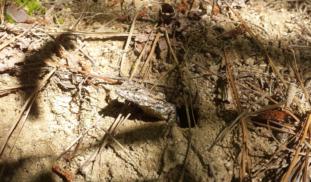104
0
0
Like?
Please wait...
About This Project
The decision of where to nest is perhaps the greatest one a lizard can make for her offspring. Many lizards dig nests in open, sunny spots because warm temperatures help lizard embryos grow and survive. However, climate warming is raising temperatures at those nest sites to the point they may soon become harmful and even lethal to lizard embryos. This project investigates whether lizards can choose shadier, cooler places to nest, which could buffer offspring from effects of climate change.

Browse Other Projects on Experiment
Related Projects
Out for blood: Hemoparasites in white-tailed deer from the Shenandoah Valley in Northern Virginia
Our research question centers about the prevalence and diversity of hemoparasites that infect ungulate poplulations...
Using eDNA to examine protected California species in streams at Hastings Reserve
Hastings Reserve is home to three streams that provide critical habitat for sensitive native species. Through...
How do polar bears stay healthy on the world's worst diet?
Polar bears survive almost entirely on seal fat. Yet unlike humans who eat high-fat diets, polar bears never...

